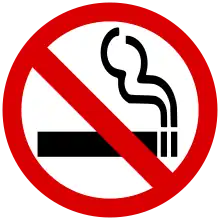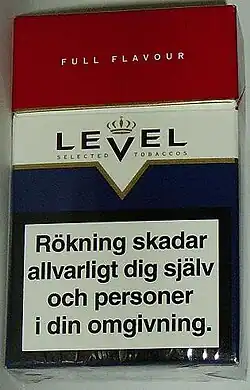Smoking in Iceland
Smoking in Iceland is banned in restaurants, cafés, bars and night clubs as of June 2007.[1] A large majority of Icelanders approve of the ban.[1] At the time the ban went into effect, almost one in four Icelandic people were smokers.[2]

Iceland has the third highest proportion of people who never smoke at 81%, when compared to other European countries.[3]
History
In 1971, Iceland became the first country to ban tobacco advertising in the mass media, movie theaters, and outdoors.[4] In addition, the country required that 0.2% of tobacco sales were diverted towards tobacco control.[4]
In 1977 all remaining tobacco promotion was banned.[4]
In 1984 the first full-length Tobacco Control Act passed making warning labels on packages mandatory, sales to those under 16-years of age banned, and smoking in certain public locations prohibited.[4]
Changes to this Tobacco Control Act includes provisions on help for quitting and more smoking bans in public locations.[4]
In 2001, all mass coverage of tobacco products was banned and it is required that these products are not visible at the point of sale.[4]
Pricing
The average cost for a 20-pack of cigarettes falls around 1,300.00 kr, or US$10.45.[5]
The price of the lowest cost cigarettes, as of 2016-17 is the brand American Legend, priced at 1055.00 ISK, or US$8.49 per pack of 20 cigarettes.[6]
The price of the highest cost, or premium cigarettes, as of 2016-17 is the brand Winston Classic Red, priced at 1271.00 ISK, or US$10.22 per pack of 20 cigarettes.[6]
Bans and policies
To legally buy cigarettes in Iceland one needs to be at least 18 years of age.[7] In addition, cigarettes are not allowed to be sold in vending machines and instead are most likely to be found in convenience stores and gas stations.[7]
Smoking is heavily restricted in restaurants, nightclubs, bars, and other public places.[6] Smoking in taxis, buses, healthcare facilities, educational facilities, and private worksites is banned.[6]
Tobacco companies are required to have a health warning or message on their packaging what describes the harmful effects of tobacco use. These warnings must not be obscured in any way and must include a photo or graphic. The law requires that 30% of the front and 35% of the rear of tobacco packages must be covered in health warnings.[6] As of January 2013, 14 new warnings must be regularly rotated.[8]
According to the Regulation No. 790 of 2011 on Picture and Text Warnings on Tobacco, article 3, these 14 warnings include:[9]

- Those who smoke die before their time.
- Smoking clogs the arteries and causes heart attacks and strokes.
- Smoking causes terminal lung cancer.
- Smoking while pregnant harms your child.
- Protect children – do not let them inhale smoke.
- Your doctor or pharmacist can help you quit smoking.
- Smoking is highly addictive, do not start smoking.
- If you quit smoking your risk of terminal heart and lung disease decreases. Smoking can cause a slow and painful death.
- Smoking can cause a slow and painful death.
- Get help with quitting: Tel. 800 6030.
- Smoking can inhibit circulation and cause impotence.
- Smoking speeds up ageing of the skin.
- Smoking can harm sperm and reduce fertility.
- Tobacco smoke contains benzene, nitrosamine, formaldehyde and cyanide.
These packages are also required to contain one of the following warnings:[9]
- Smoking kills.
- Smoking is very harmful to you and those who are close to you.
Tobacco companies are banned from advertising in certain locations to certain audiences, these direct bans include: national TV and radio, local magazines and newspapers, billboard and outdoor ads, and ads on the Internet.[10] Other indirect bans include: free distribution, promotional discounts, and product placement or appearance in TV and films.[10] Sponsored advertising of events as well as sponsorship or promotion for certain audiences is banned as well.[6]
Tobacco products sold in Iceland cannot contain more than 10 mg of tar, 1 mg of nicotine, and 10 mg of carbon monoxide per cigarette.[9]
Trends
In Iceland there isn't much of a difference between gender in respect to smoking rates: according to the WHO, 15% of adult women are reported to take part, while similarly 15.3% of adult men admit to smoking regularly.[6]
Those with higher income are reportedly less likely to smoke.[3]
Legislation
Tobacco in Iceland is regulated mainly under the Tobacco Control Act of 2002, with the most recent amendment being in 2013.[11] These laws cover the environments in which smoking is allowed or prohibited, tobacco advertising, promotion, sponsorship, and packaging and labeling.[11]
In a nation-wide effort to lower the amount of teen drug and tobacco use, Icelandic governments not only restricted the age to purchase cigarettes in their country, but imposed a curfew and introduced classes in music, dance, and martial arts to their youth.[12] This effort was made in an attempt to offer teens a "natural high alternative" to drug use.[12] Between 1998 and 2016 the percentage of 15 to 16-year-olds smoking daily fell from 23% to only 3%.[12]
E-cigarettes
According to a study done by Iceland's Directorate of Health, around 10,700 Icelanders use e-cigarettes daily.[13] This number equals approximately 5% of the total population, and is greatest among individuals younger than 35 years of age.[13]
Avenues for tobacco control
The last reported amount in 2008 states that government expenditures on tobacco control equal approximately 70,000,000 ISK, or US$562,610.87.[6]
Toll-free telephone helplines are available for help and information on quitting throughout the country.[6] Nicotine replacement therapy treatments are available for legal purchase without a prescription, and are not covered by federal or national health insurance.[6] Other treatments such as naltrexone/bupropion and Varenicline are also sold legally; however, a prescription is required and the cost is not covered by federal or national health insurance.[6]
See also
References
- "Iceland is smoke-free and happy". IceNews. 20 October 2007. Retrieved 13 August 2010.
- "Iceland stubs out smoking". IceNews. 12 June 2007. Retrieved 13 August 2010.
- "Statistics Iceland: Iceland among countries with fewest smokers". Statistics Iceland. Retrieved 2018-11-27.
- Ltd, BMJ Publishing Group (2007-12-01). "Iceland: a pioneer's saga". Tobacco Control. 16 (6): 364. ISSN 0964-4563.
- "Cost of Living in Iceland". www.numbeo.com. Retrieved 2018-11-27.
- World Health Organization (2017). "The WHO report on the global tobacco epidemic" (PDF). Archived from the original (PDF) on July 22, 2013.
- "Smoking in Reykjavík: The dos and don'ts". I heart Reykjavík. Retrieved 2018-11-27.
- "Iceland – new regulations on graphic health warnings introduced". World Health Organization. Retrieved 2018-11-27.
- "Regulation on Picture and Text Warnings on Tobacco and Measurements of the Maximum Harmful Tobacco Substances" (PDF). Tobacco Control Laws. July 11, 2011.
- "Iceland | Tobacco Atlas". Tobacco Atlas. Retrieved 2018-11-27.
- "Iceland Details | Tobacco Control Laws". www.tobaccocontrollaws.org. Retrieved 2018-11-27.
- "The Big Read: After raising legal smoking age, what next? Iceland may offer answer". TODAYonline. Retrieved 2018-11-28.
- Iceland's Directorate of Health. "Tóbakskönnun 2018" (PDF).
